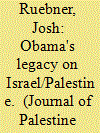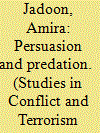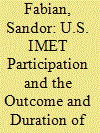| Srl | Item |
| 1 |
ID:
148605


|
|
|
|
|
| Summary/Abstract |
This retrospective assessment argues that despite the arrival in office in 2009 of a president who articulated the case for Palestinian rights more strongly and eloquently than any of his predecessors, U.S. official policy in the Obama years skewed heavily in favor of Israel. While a negotiated two-state resolution of the conflict between Israel and the Palestinians continued to be the formal goal of the United States, Israel's defiant refusal to stop settlement expansion, the administration's determined actions to perpetuate Israeli impunity in international fora, as well as the U.S. taxpayer's hefty subsidy of the Israeli military machine all ensured that no progress could be made on that score. The author predicts that with all hopes of a negotiated two-state solution now shattered, Obama's successor will have to contend with an entirely new paradigm, thanks in no small part to the gathering momentum of the Boycott, Divestment and Sanctions (BDS) movement.
|
|
|
|
|
|
|
|
|
|
|
|
|
|
|
|
| 2 |
ID:
164583


|
|
|
|
|
| Summary/Abstract |
Powerful states frequently employ foreign aid to pursue international security objectives. Yet aid's effectiveness will be undermined if it exacerbates the effects of conflict on civilians within recipient states. This article investigates how international development aid and U.S. military aid influence recipient governments' incentives and ability to target civilians. U.S. military aid has a persuasion effect on state actors, which decreases a recipient state's incentives and necessity to target civilians. Development aid flows, however, trigger a predation effect in some environments, exacerbating civilian targeting. An analysis of aid flows in 135 countries on civilian killings between 1989–2011 provides support for both the persuasion and predation effects associated with aid.
|
|
|
|
|
|
|
|
|
|
|
|
|
|
|
|
| 3 |
ID:
178642


|
|
|
|
|
| Summary/Abstract |
The United States has provides international military education and training (U.S. IMET) to military personnel from more than 100 countries annually. In spite of this, the effects of such training have received limited study in international relations literature. This article explores how these programmes affect the outcome and duration of insurgencies. It theorises that military education and training received in the U.S. improves the human capital of recipient state militaries. This improvement makes the overall military forces of incumbent governments more capable and effective in their fights against insurgents, leading to increased probabilities of government victories. This analysis also argues that improvement in incumbent governments’ military capabilities incentivizes insurgents to disperse, hide, and not engage government forces in open battles, resulting in prolonged conflicts. The statistical analysis of a new, merged dataset including detailed information on insurgencies and U.S. IMET participation between 1976 and 2003 supports both arguments.
|
|
|
|
|
|
|
|
|
|
|
|
|
|
|
|